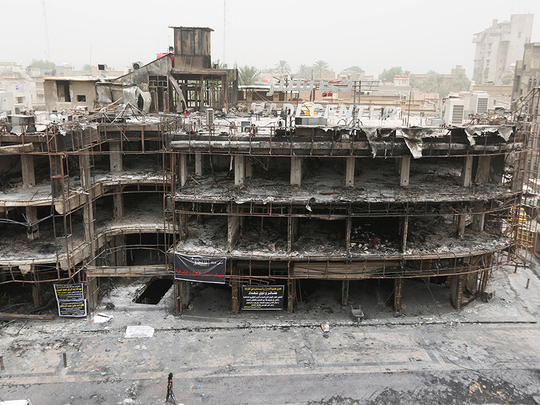
Iraq suffered one of its most devastating attacks to date when, late last Saturday, Daesh (the self-proclaimed Islamic State of Iraq and the Levant) struck a busy district in Baghdad and killed more than 200 people and injured many more. The attack suggests that even with the terrorist group on the back foot, and its control of territory diminishing, Daesh still retains the capacity to commit atrocities and strike at the heart of the country.
The Iraqi armed forces, along with Shiite militia groups and support from Iran and the United States-led international coalition against Daesh, recently took back control of Fallujah and will soon start its operation to retake Mosul — its last remaining stronghold in Iraq. However, Saturday’s attacks showed Daesh will not be eliminated any time soon, even if, as expected, its so-called “caliphate” is dismantled. That has more to do with the failures and inadequacies of the actors confronting Daesh than it does the group’s own abilities and resources.
Daesh thrives when its opponents are weak and poorly equipped. Iraq has substandard checkpoints in the country, overlapping security jurisdictions and poor intelligence capabilities. Despite billions of US dollars and international support, Iraq also lacks an effective army and continues to rely on Shiite militia groups and other non-state actors.
There is no overnight fix for these problems. Some could be generational. For example, sectarian divisions and sentiments in the country undermine the legitimacy of the Shiite-dominated government in Baghdad and its ability to provide services and security. It also raises fears that Daesh is a rebranded version of the Sunni insurgency that seeks to end the post-2003 Iraq and the rule of Iraq’s majority Shiite population. That empowers extremists and militants on both sides.
Much of the blame for Iraq’s problems today can be attributed to United States and United Kingdom policies in the aftermath of the 2003 invasion of Iraq. The Chilcot inquiry will release its findings today, looking at Britain’s role in Iraq and post-conflict reconstruction failures. However, western disengagement from Iraq, including the 2011 US withdrawal, has had its consequences.
Even without an effective and conventional army, Iraq could still prevent many terrorist attacks if it had the right intelligence-gathering capabilities. As retired General Jack Keane, a key architect of the Iraq troop surge, stated: “We had all our intelligence capability there. We knew where the enemy was. We were flying drones. We’re tracking them. We have signals intelligence pouring in, eavesdropping on phone conversations and the rest of it. We’re using our counterterrorism forces to bang against these guys. We’re passing that to the Iraqis so their commandos can do the same ... On a given day in 2011, that screen went blank. The Iraqis went from a significant amount of intelligence on what was taking place, and the screen just went blank.”
Iraq was hardly a beacon of stability during the US occupation, but since the withdrawal things have gone from bad to worse. It paved the way for the divisive and authoritarian rule of former Iraqi prime minister Nouri Al Maliki; increased Iranian influence and the prominence of Shiite militia groups (which has worsened sectarian tensions), and, many would argue, the emergence of Daesh.
For all its mistakes in Iraq, the US played the role of an honest broker when it was in the country and helped forge agreements that produced significant periods of stability, such as the “Sons of Iraq” initiative and the brokering of disputes between Kurds and Arabs. However, Iraq’s problems need an Iraqi solution. The country will never move forward in the absence of accountability. If the attacks exposed anything last Saturday it is this and the impunity Iraq’s politicians have enjoyed amid the suffering of its population and the destruction of the country. That is Iraq’s real tragedy.
Immediately after the attacks, Iraqi Prime Minister Haidar Al Abadi ordered that all fake bomb detectors be removed from checkpoints in the country. These devices were sold to Iraq and other countries as part of a global scam that generated millions of dollars. Its British creators were jailed in 2014, but Iraq continued to use them. No politician is likely to ever have to answer for the continued use of the bogus detectors or the poor state of the country’s security sector.
Reforming and stabilising Iraq requires reforming the political class, not just the security forces. It is dominated by the corrupt, by the men with guns and cash instead of those with ideas and visions. That could be achieved if Iraq’s institutions were strengthened, particularly its judiciary. A recently empowered civil society and an angry population might help achieve this, but not without the support of the international community, which could invest in these movements and grant them considerable legitimacy.
— Guardian News & Media Ltd
Dr Ranj Alaaldin is a Middle East scholar at the London School of Economics and Political Science.









